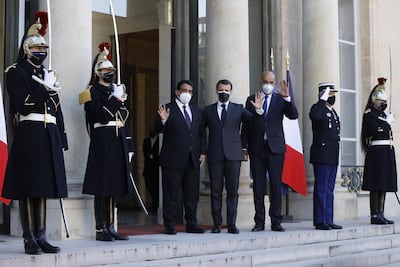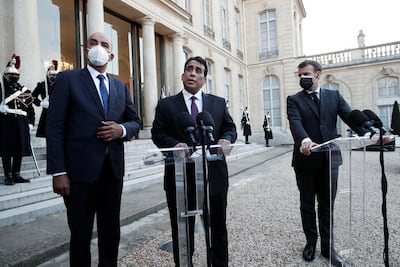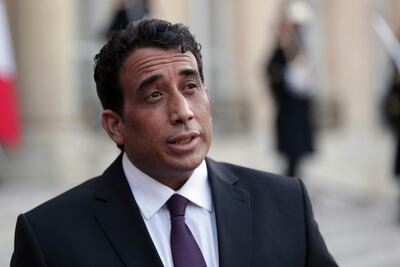France will reopen its embassy in Libya next week as a gesture of support to the conflict-battered nation after meeting its new leadership in Paris.
French President Emmanuel Macron met Mohamed Menfi and Musa Al Koni, president and vice president of Libya’s Presidential Council, at the Elysee Palace.
Mr Macron said France owed a debt to Libya and that it would support the transitional government.
“As of Monday, our embassy in Tripoli will reopen and our ambassador, who has never ceased to work to make it happen, will tread your soil to put in place everything we talked about with you,” he said.

“We must together make sure that the foreign forces on Libya’s soil leave it as soon as possible.
“Turkish fighting forces, Russian fighting forces, foreign fighters imported by them or others on Libya’s soil must leave at once because it’s up to Libya’s forces, united under your authority – and it’s the only legitimate one – to secure Libya’s soil.”
This month, the UN Security Council called for countries with troops and mercenaries in Libya to withdraw them “without delay”.
The UN has estimated that there are 20,000 foreign fighters in Libya, including Syrians, Turkish and Russians brought to the country by the rival sides.
Libya was plunged into chaos when an uprising in 2011 toppled long-time ruler Muammar Qaddafi, who was later killed.
Since 2015, Libyan state institutions have been divided between two governments: one in the east and another in the west, each supported by militias and foreign governments.
Now a UN-backed process is trying to secure peace. Mr Macron said the priority should be maintaining the ceasefire, leading the country towards elections in December and unifying the Libyan armed forces.
“There will be no peace” in the broader region “if we can’t get peace and stability in Libya, if we do not succeed in eradicating the terrorist groups and all kinds of smugglers", he said.
Libya's interim government, which includes a three-member presidential council and a Cabinet, took power amid international pressure to put into effect a UN-brokered political road map.
That road map, agreed to last year, sets December 24 for general elections in the country.



